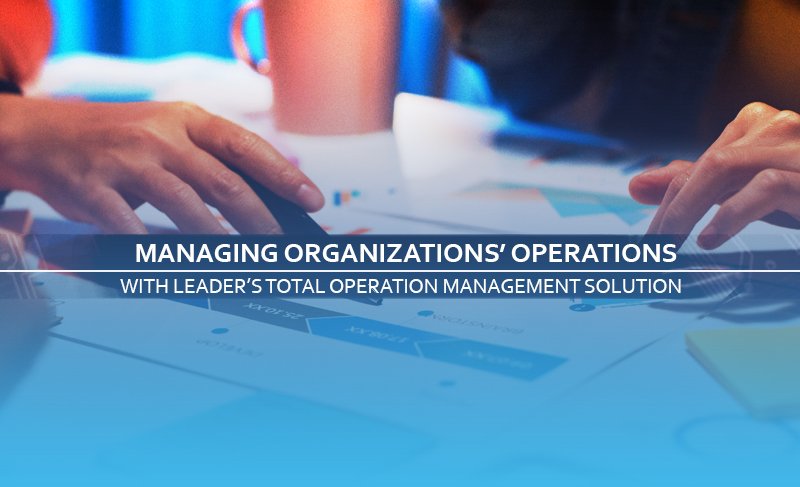
Managing Organizations’ Operations with Leader’s Total Operation Management Solution
“Leveraging the digital tools in organizations’ operation management not only boosts the organizations’ performance but also result in a scalable business that propels growth.”
The COVID-19 pandemic has given birth to Industry 4.0; the digital revolution as they call it, which has made the industries change the ways of doing businesses in one way or the other.
With the rising demands of digitized business practices, organizations move towards transformed innovative business practices.
Any organization comprises several operations that form the core of its business.
Hence, operations management becomes imperative to tackle the peculiarities of the business processes with utmost efficiency.
New generation methods of doing business and digital models transform an organization’s operating model by applying digital, automation, AI, and other emerging technologies that enhance business processes.
According to recent research, global digital technologies have increased from USD 2 trillion to USD 3 trillion this year.
This significant rise in digital spending contributes to increased digitization and the rising need for emerging technologies to run businesses.
The rise of the digital revolution has brought about irreversible trends shaping the future of work in unimaginable ways.
This revolution increases the need for a radical reimagining of the end-to-end operating model for businesses dealing with multiple business practices.
The rapid pace of innovation in digitized business practices transforms customer behavior and demands digital channels more.
Another research suggests that digitized business practices have resulted in 25% cost improvement; 50% faster turnaround time, and ten times more access to emerging technologies.
Moreover, the operations in the workforce’s extensive industries such as manufacturing; oil and gas, building, and construction see a rise in customer-driven digitized business practices that enhance overall business activities.
Digitized Operation Management System – Critical Components:
Digitized operations result in digitally-driven business practices that drive business growth.
It improves the business processes and enhances the overall functionality of business activities.
Digital capabilities are indeed relatively new to the business world. But even as organizations balance lower investment in traditional operations against more significant investment in digital; the need for operations management is only going to increase as time passes by.
Less Turnaround time:
Businesses these days cannot afford to have a high turnaround time owing to the rise in multiple business practices, and hence the surge in business practices that cut down the turnaround time is one rise.
By leveraging the emerging technologies, the services and products are delivered at a fast pace, resulting in less turnaround time than the less digitized business practices.
Higher Efficiency:
Businesses with digitized business practices are comparatively more efficient than those of nonp0digitized ones.
Operational processes in IT business activities such as writing business software codes, running those codes, debugging, and performing implementation operations take place with more efficiency, consuming less time and saving costs.
Hence, the business processes with lower operational costs and higher operational efficiency remain the best choice among the businesses.
More Cost Savings:
Improved business practices result in more cost savings.
Businesses with comparatively more efficiency are less on costs and turnaround time, making the companies more preferred than other processes.
Cost savings not only helps with higher revenue but also result in profitable, scalable business for organizations.
Leader Group’s Total Operation Management System combines an Operation Management framework that provides customized software solutions and cloud computing tools for business.
It eases organizations’ management tasks, improves the overall operational efficiency of their business; and ensures their organization experiences through the benefits of a comprehensive Operation management framework.
Additionally, it combines various sub-processes that take care of critical business activities involving an organization’s overall operational processes.
Some of the sub-processes under total operation management solution involve Incident Management System, Contact Centre, Escalation Management System, Fleet Management System, Geographical Information System, Workforce Management System, Solid Waste Management system among others.
These sub-processes ensure effective business processes that incur fewer costs, fewer wastages, reduced turnaround time, and time savings, ultimately improving overall business performance.
Also, the total operation management system consultative approach from Leader Group provides customized software solutions and cloud computing tools for businesses using Unified Communication Center and other management consulting solutions.
The benefits that Leader Group’s Total Operation Management System offers include an all-encompassing business tool, more effective and efficient processes, Improved planning scheduling, Remote access to files and folders, and better accountability.
Furthermore, it eases organizations’ management tasks, improves the overall operational efficiency, and reaps the unparalleled benefits of operations management consultation.
Its one-of-its-kind comprehensive approach to operations management continues to innovate and use the latest technology to create practical solutions.
Conclusion:
Digital is the future. The advent of rising digitized practices leverages the digital tools and technologies that enhance business practices.
Operations management is one of the most complex processes, especially with extensive workforce industries.
Leader Group’s consultation on Total Operation Management Solution eases the entire workflow of business activities and enhances business growth.





